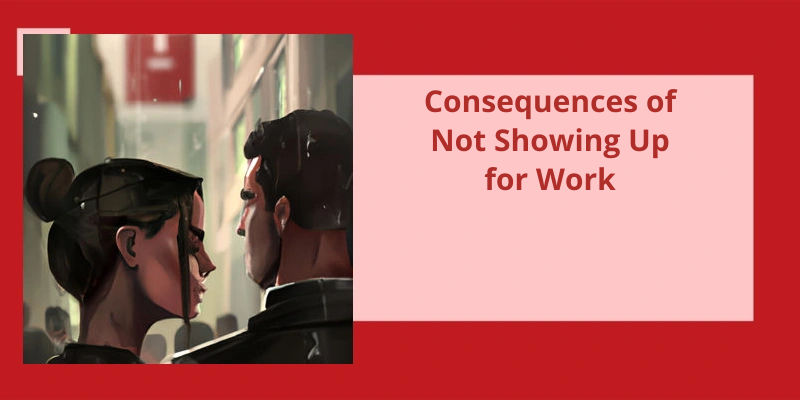The importance of showing up to work on time can’t be overstated in today's modern workforce. Employers rely on their employees to be present and punctual, ensuring the smooth operation of their businesses. However, there may be times when employees are unable or unwilling to fulfill their duties and responsibilities, leading to serious consequences. The repercussions of not showing up for work can range from minor inconveniences to severe disciplinary action, including termination of employment. While some employers may have more lenient policies in place, it’s crucial for employees to understand the implications of their actions and strive to maintain a strong attendance record.
What Is a Good Reason for a No Call No Show?
Another possible reason for a no-call no-show could be due to a sudden family emergency or personal crisis that requires immediate attention and doesn’t allow for prior notification. This could include situations such as a house fire, a sudden death in the family, or a loved one who needs urgent medical attention.
Sometimes, work-related issues could arise that make it impossible for an employee to show up for their shift, such as car trouble on the way to work or a last-minute change in scheduling which the employee was not informed of. These types of situations can be difficult to anticipate and can result in a no-call no-show if the employee is unable to notify their employer in time.
This can help to avoid misunderstandings, ensure that the employees job is secure, and may even provide an opportunity for the employer to offer support and resources if needed.
Good communication is key when it comes to maintaining a positive and productive work environment, and being transparent and honest about the reasons for an unexpected absence can go a long way in building trust and maintaining a good relationship with your employer.
It’s important to understand the consequences of not showing up for work when you’ve quit your job. Without any prior communication, your employer will assume you’ve voluntarily quit and your employment will be terminated. The following are some things you should keep in mind if you’re planning to quit or stop showing up for work.
What Happens if You Quit and Don’t Show Up?
In most cases, not showing up to work without prior notice can have serious consequences. It can make the organization question the employee’s reliability, dependability, and their commitment to their duties. In cases where the employer doesn’t have a policy for the notice period before quitting, an unannounced absence can have severe implications for the employee. Failure to show up to work for a sustained period of time, generally a week or more, without any contact can lead to the assumption that the employee has abandoned their job.
As an employee, quitting without notice, particularly if they don’t have an unusual reason, can blacken their record at the company. It can lead to the employee being marked as a “no-rehire” possibility in the organization. In the process, the employee’s name may be deleted from future openings, and the exclusion may be extended to the company’s other locations or differently branded organization in the industry.
Additionally, an employee’s job history and their former employers may also be examined by new companies when looking to hire them. If an employee has a lost a previous employment due to not showing up to work, this can have negative consequences on their future job possibilities. It can appear that they aren’t committed to their jobs, and this could affect their chances of getting another position.
Furthermore, the lack of notice makes the process of filling the employee’s vacancy significantly harder for their coworkers and the employer. The employee’s responsibilities still need to be covered, and their job additionally must be completed by other staff until a replacement is found. If an organization depends on the employee for their specific skill set or if they’ve responsibilities that are difficult to fill, such an abrupt exit can wreak havoc in the organization.
Nothing good can happen when an employee unexpectedly ceases turning up for work without stating reasons. The unscheduled break can generally prompt the employer to quickly terminate the employees contract, which could have future complications. It could also suggest a lack of responsibility, and commitment on the part of the employee, in the long run, and display disregard for their fellow workers welfare. Thus, employees must always follow the proper exit protocol to minimize the negative after-effects.
The Importance of Proper Communication and Notice Period Before Quitting a Job.
It’s important to communicate and provide sufficient notice period before quitting a job to ensure a smooth transition and maintain positive relationships with superiors and colleagues. Failing to do so can lead to disruptions in workflow, strained relationships, and negative impacts on one’s future job prospects.
Source: Am I allowed to quit but just not showing up? With no notice.
It’s important to understand the full impact of job abandonment on both the employee and employer. Not only can it lead to legal consequences, but it can also damage a person’s professional reputation and limit their future job opportunities. Let’s explore the effects of job abandonment in more detail.
How Does Job Abandonment Affect You?
Job abandonment is a serious issue that can have far-reaching consequences for both employers and employees. When employees decide to leave their jobs without notice, it disrupts daily operations and puts a strain on management and other team members who’re left to pick up the pieces. Depending on the severity of the case, it can result in legal consequences including fines or even jail time. Employers may also face financial losses due to the cost of hiring and training replacement employees, as well as lost productivity.
Whether it’s due to dissatisfaction with the job or personal circumstances outside of work, it’s important for employees to provide notice and work with their employers to ensure a smooth transition. Employers can also do their part by providing a supportive and engaging work environment that encourages open communication and fosters a sense of loyalty and commitment among team members.
It can be concerning to think that missing just one day of work could result in termination. However, as an at-will employee, there may not be much protection in place unless there’s a legally protected reason for the absence. Let’s explore this topic further to understand the rights and responsibilities of both employers and employees.
Can My Boss Fire Me for Missing One Day of Work?
In most instances, employees are hired on an at-will basis. This means that either the employee or employer can terminate the employment at any time for any reason (or no reason at all) without notice. Therefore, if you’re an at-will employee and miss a day of work without permission, your boss may very well choose to terminate your employment if that’s what they deem appropriate.
However, it’s important to note that certain legal protections do exist for employees who may need time off due to disability, illness, or other protected reasons. For example, the Americans with Disabilities Act (ADA) requires employers to make reasonable accommodations for employees with disabilities, which may include providing time off as needed. Additionally, the Family and Medical Leave Act (FMLA) allows eligible employees to take up to 12 weeks of unpaid leave for certain medical or family-related reasons.
If you believe that your missed day of work falls under one of these categories, you may want to speak with an employment lawyer to discuss your rights and potential recourse. Otherwise, it’s best to avoid missing work without prior authorization and to communicate effectively with your employer regarding any necessary time off.
It’s important to keep in mind that missing work can have consequences beyond just the risk of being fired. Depending on your companys policies, you may lose pay or face other disciplinary action for unapproved absences. Additionally, frequent absences can impact your overall job performance and potentially damage your professional relationships with colleagues and superiors.
If you’re facing personal or health-related challenges that may make it difficult to maintain a regular work schedule, it’s important to have an open and honest discussion with your employer to see if any accommodations can be made. In some cases, flexible work arrangements like telecommuting or alternative schedules may be possible.
Ultimately, the best way to ensure job security is to consistently show up to work on time and perform your job duties to the best of your abilities. While unforeseen circumstances may arise, it’s always best to communicate with your employer and seek solutions whenever possible.
It’s not uncommon for employees to face personal circumstances that might cause them to abruptly stop showing up to work. But what’re the consequences of this action, and how do employers typically deal with no calls/no shows? With the pandemic and tighter labor market, some employers have been experiencing this more frequently. In this article, we’ll explore what happens if you just stop showing up to work, and what steps you can take to avoid negative consequences.
What Happens if I Just Stop Showing Up to Work?
When an individual stops showing up to work without any warning, the employer is forced to make assumptions about their intentions. At first, the employer may try to reach out to the employee and inquire about the reasons behind their absence. However, repeated unresponsiveness could mean that the employee has quit the job.
In such a situation, the employer will most likely terminate the individuals employment after a reasonable period of time has passed without any communication. Terminations like this usually stem from a lack of communication or cooperation between the employee and the employer.
If an individual abruptly quits their job, it can cause a variety of issues for both parties involved. From the employers perspective, this can create additional stress and financial strain, especially if they’re in a time-sensitive industry. On the other hand, the employee may face the impact of leaving a job without properly addressing the situation.
While it may feel tempting to simply stop attending your job with no explanation, it’s important to remember the impact it could have on yourself and your employer. It’s always best to seek communication with your employer to ensure that there’s mutual understanding of the terms of employment and if there’s anything that can be done to alleviate any issues.
Disappearing from your job without any communication creates an avoidable conflict which can damage the relationship between the employer and the employee. If this behavior continues, there’s a chance that the employee may be considered to have abandoned their job, resulting in either termination of employment or other legal issues. It’s always better to maintain an open line of communication with your employer and seek to address any concerns or issues that may arise.
Conclusion
In either case, the consequences of not showing up for work can be severe. For the individual, it can mean losing their job and source of income. It can also lead to a tainted reputation that may hinder future career opportunities. For the employer, it can result in decreased productivity, increased workload for other employees, and a strain on client relationships. Additionally, unplanned absences can disrupt the flow of business and lead to missed deadlines or lost business opportunities. Therefore, it’s critical for individuals to prioritize their attendance and for employers to establish clear policies and consequences to ensure that all employees are held accountable. Ultimately, failure to show up for work can have far-reaching consequences that extend beyond the individual employee and impact the overall success of the business.






